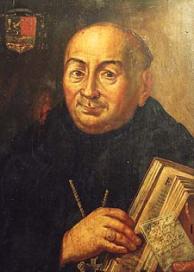ORIGINS AND BRIEF HISTORY
Hard times
At the end of the Middle Ages, Galician language entered into a period of decadence both in formal and literary contexts. This was mainly due to a socio-political context controlled by a governing class, alien to the cultural and identity interests of Galicia.
Despite the survival of the language in the private field and the settings of informal communication, Galician was absent from written uses for a long period of three centuries —16th, 17th and 18th centuries—, called Séculos Escuros (Dark Centuries).
In the 18th century there were voices which —influenced by the illustrated ideas— showed their concern about the undervelopment of Galician and fought for its standardization and its introduction in school.
An outstanding figure in this period was Brother Martín Sarmiento (1695-1779). One of his main concerns was the scientific knowledge of Galician. He worked on this issue doing fieldwork and publishing it in many essays. The same interest was inherited by Brother Juan Sobreira (1746-1805). Brother Sarmiento was also concerned by the social marginalization of the language. He denounced the situation and wanted Galician to be the language of school, administration and church.



